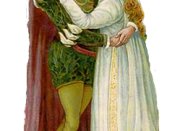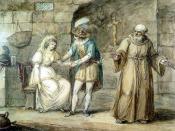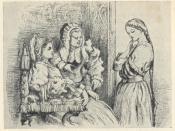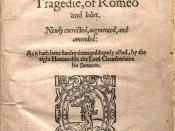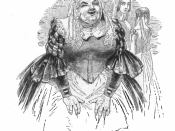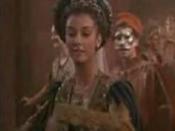Shakespeare does convey love intensely. The love the characters have for each other, no matter what form, is shown in many scenes, especially when a tragedy has just occurred. There are many different forms of love in Romeo and Juliet.
One of the most important types of love in the play is the protective love Friar Lawrence and the Nurse had for Romeo and Juliet. It is because of this love that Romeo and Juliet were able to pursue their love and to get married. Friar Lawrence and the Nurse are also two of Romeo Juliet's closest friends and 'allies'. They are the people who Romeo and Juliet go to for advice. For example in Act 2 Scene 3 Friar Lawrence says "God pardon sin, wast thou with Rosaline?" which indicates that Romeo has gone to the Friar for advice before and that he obviously told him about his infatuation with Rosaline.
Romeo also probably thinks of Friar Lawrence as a father. Friar Lawrence is also the first person Romeo goes to after he has met and fallen in love with Juliet. The Nurse is also the person who has looked after and raised Juliet since she was born. This reflects the fact that in Shakespeare's time it was common practice for mothers to employ a Nurse to raise their children, and for them to deal with all the children's problems and tantrums. Because of this Juliet trusts the Nurse implicitly; even Lady Capulet trusts the Nurse. This is shown in Act 1 Scene 3 when Lady Capulet wishes to speak to Juliet about marriage and sends the Nurse out, but she calls her back in at the last minutes. She says "This is the matter - Nurse, give leave awhile, We must talk in secret. Nurse, come back again, I have remembered me, thou's hear our counsel.
Thou knowest my daughter's of a pretty age." But the Nurse breaks Juliet's trust when she suggests that Juliet should commit bigamy and marry Paris when Romeo is banished, in Act 3 Scene 5 the Nurse says "I think it best you married with the County.
O he's a lovely gentleman.
Romeo's a dishclout to him" The last part of this statement further angers Juliet and she become cold and distant to the Nurse and she also insults her after she has left, calling her an "Ancient damnation!" and a "most wicked fiend!" But you could interpret the Nurse's actions in two different ways, you could say that the Nurse was just being a coward and looking for a way out of the mess she got herself into, therefore preventing her from getting into any trouble, because if anyone found out about Juliet's marriage to Romeo and that she knew about it, she would be in very big trouble (most likely dismissed from her job). Or you could say that she was trying to help Juliet be happy and to prevent Juliet's heart being broken, because she knew that if Romeo did come back for Juliet, their parents could never know about their marriage and that they wouldn't be able to live in Verona since Romeo was banished. The Nurse could have also predicted that this wouldn't end in happiness but in tragedy; this means that the Nurse was just trying to protect Juliet. It is also because of the Nurse's betrayal that Juliet turns to Friar Lawrence for guidance. The Friar is now the only person that Romeo and Juliet can trust with their secret. And out of love for Romeo and Juliet, Friar Lawrence formulates a plan that will hopefully bring Romeo and Juliet back together, and he gives Juliet the potion for "borrowed likeness of shrunk death". Many people believe that it was the Friar's fault that Romeo and Juliet died and that if it was not for him, they could have announced their marriage once everything had calmed down a bit.
A different form of love conveyed in Romeo and Juliet is friendship and loyalty. This friendship and loyalty is the reason why Romeo is banished from Verona. Romeo and Mercutio are best friends and it is Mercutio who persuades Romeo to go to the Capulet feast so that he could compare Rosaline, whom he was infatuated with, with "all the admired beauties of Verona." But even though Mercutio is not a Montague he still hates the Capulets, this means that Romeo cannot tell him about his marriage to Juliet. And when Tybalt picks a fight with Mercutio. Benvolio, who is a good friend to both Mercutio and Romeo, tries to stop them "We talk here in the public haunt of men, Either withdraw into some private place, And reason coldly of your grievances, Or else depart; here all eyes gaze on us." But Mercutio ignores him and continues to taunt Tybalt until Romeo arrives. Tybalt immediately challenges him, but Romeo refuses, since Tybalt is now his cousin. Mercutio, thinking that Romeo is being a coward accepts Tybalt's challenge instead; this shows just how little faith he has in Romeo even though he is Romeo's best friend. This example also shows the importance of honour in Shakespeare's time. Unfortunately Mercutio is stabbed under Romeo's arm when he goes between them to try and stop the fight. Just before he died, Mercutio shouts "A plague on both your houses! They have made worms meat of me. I have it, And soundly too. Your houses!" This way Mercutio lays a curse on both the Capulets and the Montagues, it is like an omen of what happens to Romeo and Juliet. The fact that Mercutio curses both houses shows that he is very angry with Romeo, because friends do not curse each other. When Romeo realises that Mercutio is dead, he became furious "And fire-eyed fury be my conduit now." At this point he completely forgets Juliet and the fact that Tybalt is now his cousin, and he fights and kills Tybalt out of loyalty to Mercutio. This shows how strong Romeo and Mercutio's friendship is, even though Mercutio cursed Romeo's family. Instantly Romeo realises what he has done, he says "O I am fortune's fool!" suggesting that the gods are mocking him. Romeo goes to Friar Lawrence's cell to hide from the Prince; this is another example of the protective love from the Friar. When the Prince questions both the Capulets and the Montagues, Benvolio makes sure that the Prince knows that it was not entirely Romeo's fault and that Tybalt killed Mercutio first, because not only is Benvolio Romeo's friend but he is Romeo's cousin as well. This way Benvolio reduces Romeo's sentence from death to banishment. But Mercutio and Romeo were friends before this fight; an example of this is in Act 1 Scene 1, when Romeo is still infatuated with Rosaline and the fact that Mercutio cares enough about Romeo to ask about his trouble shows that they are good friends. Loyalty is not just among friends; Juliet has loyalty to Romeo. For instance when the Nurse accuses him of murdering Tybalt, she tells her "blister be thy tongue for such a wish" and Juliet will not speak ill of Romeo, "Shall I speak ill of him that is my husband?" And even though she weeps for her cousin, she weeps more for her husband who is banished.
The foundation of the play is family, if it was not for their families Romeo and Juliet would not have been pushed into marrying in secret and into killing themselves. Therefore the love between family members plays a very important part. Family love plays the biggest part in Act 3, where Tybalt and Mercutio are killed, and when it is announced that Juliet will marry Paris. When Tybalt dies in Act 3 Scene 2, everyone in the Capulet family grieves for him especially Lord and Lady Capulet who seemed to treat him as the son that they never had. Juliet becomes worried about them and asks the Nurse about them. Lord and Lady Capulet have arranged a marriage for Juliet. Today people are disgusted by arranged marriages, but in Shakespeare's time it was the duty for a parent to make sure that their daughter was married to a good, wealthy husband. Therefore when Lord Montague told Juliet that she is to marry Paris, he thought that she should be grateful that her father has found such a good man. But when she refuses he was absolutely furious, "Hang thee young baggage, disobedient wretch! I tell thee what, get thee to church on Thursday, Or never after look me in the face." Even her mother turns on her, "Do as thou wilt, for I have done with thee." In Act 1 Scene 1, Lord and Lady Montague are worried about Romeo because has been sulking about the fact that Rosaline does not return his 'love'. They have asked him several times about why he is so sad but he does not tell them, "his own affections' counsellor". But they are still worried so Mercutio offers to talk to Romeo instead "I'll know his grievance or be much denied".
I do agree with this judgement to some extent, as Romeo and Juliet is mainly a play about love and the tragedy that can come as a result. But the fact that in Shakespeare's time the female parts were all played by men, therefore the intensity of the love might not have been as much as you would see in films and stage productions today. Shakespeare also does not convey all the aspects about love, because there are simply too many sides to it. But the aspects that he does write about are very passionately described with many examples throughout Romeo and Juliet.
